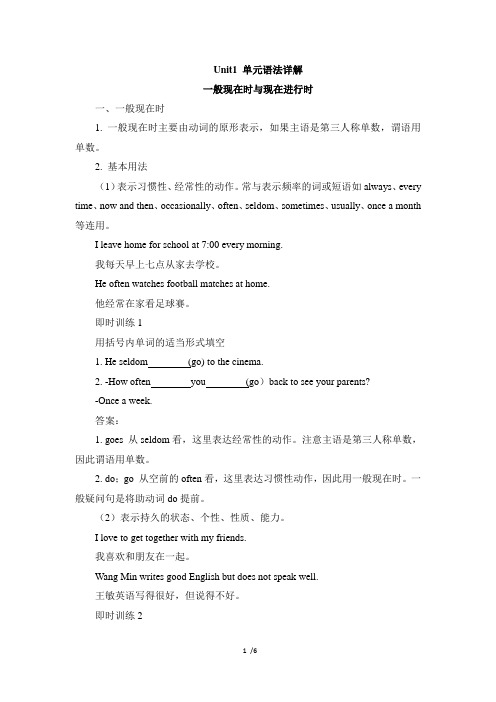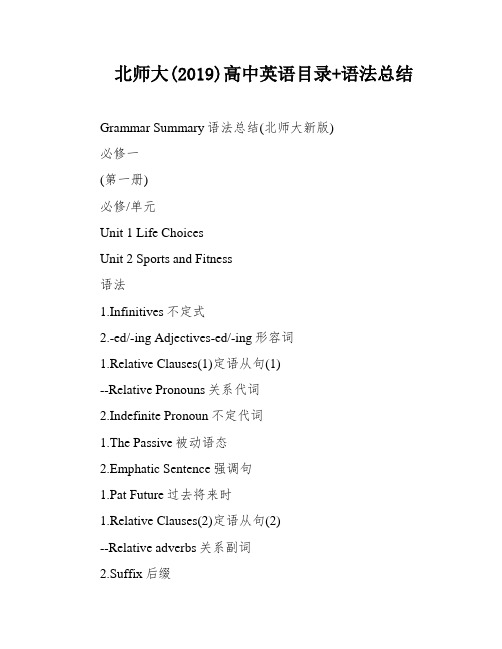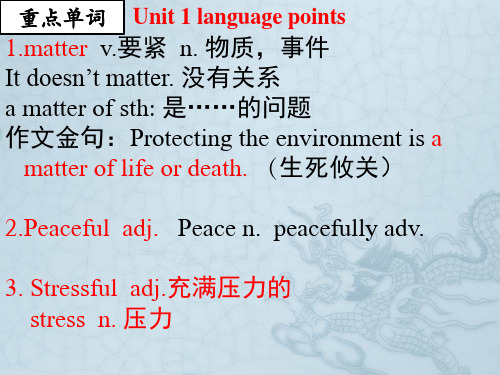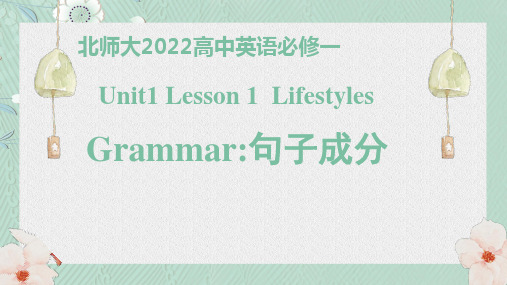北师大版高一英语语法(必修一-必修
北师大版高一英语语法(必修一-必修

北师大版高一英语语法(必修一-必修The North China Normal University Press n of English Grammar for r High School (Books 1-4)Book 1Unit 1: Simple Present Tense and Present Continuous ___1.Simple Present Tense: ___)Eg: ___.Or for states: I live in Beijing.Simple Present Tense is often used with time adverbs such as always。
usually。
from。
time to time。
twice a week。
rarely。
seldom。
once a month。
never.2.Present Continuous Tense: ___ over a d of time.Time adverbs used with Present Continuous Tense include just。
now。
at the moment。
at present.Unit 2: Simple Future ___: Plans and ns1.Be going to is used to express plans.2.Present Continuous Tense is used to express arrangements that have already been made.Eg: I’m getting married in ___.3.Simple Present Tense is used for ___.Eg: The summer term begins on the 15th of February.Unit 3: Simple Past Tense and Past Continuous Tense1.Simple Past ___: ___.Eg: ___ and went to her room.Regular verbs are formed by adding -ed to the base form of the verb。
北师大版高一英语必修1_Unit1_单元语法详解

Unit1 单元语法详解一般现在时与现在进行时一、一般现在时1. 一般现在时主要由动词的原形表示,如果主语是第三人称单数,谓语用单数。
2. 基本用法(1)表示习惯性、经常性的动作。
常与表示频率的词或短语如always、every time、now and then、occasionally、often、seldom、sometimes、usually、once a month 等连用。
I leave home for school at 7:00 every morning.我每天早上七点从家去学校。
He often watches football matches at home.他经常在家看足球赛。
即时训练1用括号内单词的适当形式填空1. He seldom (go) to the cinema.2. -How often you (go)back to see your parents?-Once a week.答案:1. goes 从seldom看,这里表达经常性的动作。
注意主语是第三人称单数,因此谓语用单数。
2. do;go 从空前的often看,这里表达习惯性动作,因此用一般现在时。
一般疑问句是将助动词do提前。
(2)表示持久的状态、个性、性质、能力。
I love to get together with my friends.我喜欢和朋友在一起。
Wang Min writes good English but does not speak well.王敏英语写得很好,但说得不好。
即时训练2完成句子1. He (喜欢打篮球).2. Who (它属于)?3. The cloth (容易洗).4. Water (结冰)at 0℃.答案:1. likes playing basketball 此处表达某人的喜好,因此用一般现在时。
主语是第三人称单数,因此谓语用单数。
2. does it belong to 此处表达所属关系,因此用一般现在时。
【北师大版高一英语必修一知识点总结】北师大高中英语必修一

【北师大版高一英语必修一知识点总结】北师大高中英语必修一北师大版高一英语必修一知识点总结北师大版高一英语必修一知识点总结北师大版高一英语必修一知识点总结(一) 1. be good to 对….友好 2. add up 合计 3. get sth done 使…被做4. calm down 镇定下来5. have got to 不得不 6. walk the dog 遛狗7. make a list of 列出8. hide away 躲藏;隐藏9. be concerned about 关心;挂念10. share sth with sb 和某人分享某物11. go through 经历;仔细检查12.set down 放下;记下13. a series of 一系列;一套14. be crazy about 对…着迷15. on purpose 故意16. in order to/ so as to 为了17. face to face 面对面地18. get along with 与…相处19. pack up 收拾,打理行装20. according to 按照;根据…所说21. communicate with sb 和…交际22. try out 试验;试用23. join in 参加(活动) 24. fall in love 相爱25. have the/a habit of doing sth 有做…的习惯北师大版高一英语必修一知识点总结(二) 1. such as 例如 2. believe it or not 信不信由你3. come up with 提出come up (vi) 走进;上来;发生;被讨论come up to a place 参观某地 4. ever before 从前5. even if/ though 即使6. at the end of 在…末期7. be based on 在...基础上8. close to 距离…近9. take…with…随身携带10. the same…as 与…相同的11. at present 目前12. at sb’s request 应某人的要求make a request 请求request that …(should)+v原形13.have a command of掌握give commands 命令14.in one direction 朝一个方向15. be different from 与…不同16. as we know 正如我们所知17. play a role/ part (in) 在…中担任角色;在…中起作用;play an important role/ part 在…中起重要作用18. because of 因为;由于19. make (good/ full) use of (好好/充分)利用北师大版高一英语必修一知识点总结(三) 1. one-way fare 单程票round-trip fare 往返票2. graduate from 从…毕业3. care about 忧虑,关心care for喜欢,照顾care to do愿意/同意做某事 4. give in (to) 投降;屈服;让步give up 放弃give up doing/sth as usual 像往常一样5. at midnight 午夜6. attitude to/ toward(s) 对…态度7. change one’s mind 改变主意8. make camp 野营,宿营9. make up one’s mind to do 决心干某事10. put up one’s tents 搭起帐篷11. persuade sb to do sth= persuade sb into doing sth 说服某人做某事persuade sb not to do sth= persuade sb out of doing sth 说服某人不做某事12. determine to do sth ( 动作) / be determined to do sth (心理) 决心干某事13. take one’s breath away 使某人大吃一惊北师大版高一英语必修一知识点总结(四) 1.have time to do 有时间做某事 2.happen to do 碰巧做某事 3.shake hands with sb 握手 4. burst into tears/ laughter 突然大哭/大笑5.in ruins 成为废墟6.blow away 吹走、刮走7.fall down 倒塌8.be pleased to do 乐意做某事9.tens of thousands of 成千上万10. dig out 挖掘11.think little of 对……评价低12.be proud of / take pride in 以……而自豪13.invite sb to do sth 邀请某人做某事14.think highly of 对……评价高15.give out 发出(气味等);分发;耗尽give off 发出(气味等) give away 赠送;泄露give back 归还16.a great/ large number of =a great many/good 大量的17.be trapped in/ under 陷入……/ 陷在……下面18.agree on sth 达成一致意见19.as you know 正如你所知道的20.be known as 作为……而知名be known for 因……而出名。
北师大(2019)高中英语目录+语法总结

北师大(2019)高中英语目录+语法总结Grammar Summary语法总结(北师大新版)必修一(第一册)必修/单元Unit 1 Life ChoicesUnit 2 Sports and Fitness语法1.Infinitives不定式2.-ed/-ing Adjectives-ed/-ing形容词1.Relative Clauses(1)定语从句(1)--Relative Pronouns关系代词2.Indefinite Pronoun不定代词1.The Passive被动语态2.Emphatic Sentence强调句1.Pat Future过去将来时1.Relative Clauses(2)定语从句(2)--Relative adverbs关系副词2.Suffix后缀1.Relative Clauses(3)定语从句(3)--prepositions+which/whom介词+which/whom2.Synonyms and Antonyms同义词和反义词1.Noun Clauses名词从句1.Verb-ing and-ed Forms动词-ing和-ed形式1.Verbs Followed by Verb Form or Infinitive接动词-ing形式或不定式的动词2.Subject-Verb Agreement主谓一致Unit 3 Celebrations 必修二(第二册)Unit 4 Information TechnologyUnit 5 Humans and NatureUnit 6 The Admirable必修三(第三册)Unit 7 ArtUnit 8 Green LivingUnit 9 LearningGrammar Summary语法总结(北师大新版)选修一(第一册)选择性必修/单元Unit 1 RelationshipsUnit 2 SuccessUnit 3 Conservation语法1.Past Perfect过去完成时1.Verb-ing Form动词-ing方式2.Articles冠词1.Relative Clauses(4)定语从句(4)--Defining and Non-defining Relative Clauses限定性和非限定性定语从句1.Continuous tenses: present perfect continuous, past perfect continuous, future continuous举行时态:目前完成进行时、过去完成进行时、将来进行时something done have/get something done结构1.It人称代词ited to and would used to和would1.Verb-ed Form动词-ed形式2.Negative Expressions表达否定意义的词或词组1.State Verbs and Activity Verbs状况动词和举措动词1.The Perfect完成时2.Phrasal Verbs(2)短语动词(2)1.Passive Forms in the Past曩昔时中的被动语态1.Modal Verbs情态动词1.Adjectives形容词选修二(第二册)Unit 4 HumourUnit 5 EducationUnit 6 The Media选修三(第三册)Unit 7 CareersUnit 8 LiteratureUnit 9 Human Biology选修四(第四册)Unit 10 Connections。
北师大英语必修一unit 1 词汇短语句型总结 知识点

4. I am always the first person to get to the office. 在序数词,last,最高级后使用to do充当后置定语。 例:The last person to arrive at the restaurant will pay the bill. 5. As a teacher, I feel it’s my duty to do something for students in poor areas. it做形式主语,to do充当真正的主语。 6. Teaching in Inner Mongolia is going to be a great challenge for me. -ing充当主语
4. suppose vt 认为,猜想 be supposed to do sth. 应该做某事
5. Complain v. 抱怨 complaint n. 投诉 complain to sb about sth
6. switch on switch over switch off
7. go off: 离开;灯熄灭;铃声响
2. Of course, we couldn’t live this lifestyle without a good wife. 虚拟语气 3. It takes me less than fifteen minutes to wash, get changed, have breakfast, leave home and get on a bus. 记住这个重点句型
重点句型
1. I always take my portable TV and I sit on the stone wall while my dog walks around in a circle. while表示对比,译为“而” 例:In some countries, men stay at home while women wቤተ መጻሕፍቲ ባይዱrk outside.
北师大高一英语必修一知识点与练习

北师大高一英语必修一知识点与练习必修一第一单元:一般现在时,现在进行时,be going to第二单元:一般过去时,过去进行时,现在完成时第三单元:被动语态,情态动词北师大版高一英语必修一第1单元一.重点句法词法。
Lesson 11. relaxing. Relaxing 是由及物动词relax+ing构成的形容词,意思是“轻松的,令人放松的”。
Boring和relaxing的构词法相同,意思是“令人厌烦的,单调乏味的”。
Relaxed“放松的”和 bored“无聊的”常用来修饰人;而relaxing和boring 均表示“令人……”,常修饰物。
Mary felt relaxed to make a relaxing conversation with a good friend, while Peter got bored with a lot of boring homework to do.和一个好朋友的轻松交谈让玛丽感到很放松,而要做很多无聊的作业使彼得感到很厌烦。
The teacher said something relaxing to get him relaxed, so Peter decided to do something satisfying to make the tacher satisfied.老师对他说了一些让人放松的事情使他放松,于是彼得决定做点儿令人满意的事情让老师满意。
2.suppose(认为,猜想)的用法。
(1)suppose+that从句,表示“猜测,假定”。
I suppose that you are right.. 我想你是对的。
(2)supose+名词/代词+to be…表示“认为……是……”Many people suppose him to be over 50.许多人认为他已经50多岁了。
(3)suppose/supposing作“假定,设想”讲,相当于连词if.Suppose you are wrong,what will you do then? 假如你错了,你将会怎样做呢?(4)be supposed to“被期望做……,应该做……”表示劝告、建议、义务、责任等,相当于情态动词should.Am I supposed to clean all the rooms or just this one? 我是应该打扫所有房间呢还是只这一间?They were supposed to be here an hour ago.(5)用于简略答语中。
北师大版高中英语必修一Unit1-Lesson1-Lifestyles语法-句子成分课件

人称的变化
3. I feel excited because this school differs in many ways from my
previous one.
4. My new school life is very exciting.
单复数的变化
5. The girls in my class are beautiful./The boys in my class are
系动词分类
状态系动词 感官系动词 表像系动词
be动词
I am a teacher. You are a student.
feel,sound,smell,taste... I feel excited. It tastes delicious.
seem,look,appear...
He looks tired. The water feels cold.
invite/want/allow/decide/determine/manage/pretend/ afford/plan/expect/ask/offer enjoy/avoid/finish/imagine/keep/risk/practise/suggest /can’t help/give up/look forwards to
总结:名词/名词词组/代词/数词/动名词/动词不定式/从 句都可以充当句子的主语。
谓语:
定义:主语具有的特征/状态(系动词)或者主语做出的动作(谓语动
词)。且有人称/数/时态的变化。
位置:陈述句中,一般位于主语之后。
系动词:1. I am Joe, a student from London.
2. Maybe she is right.
(完整版)北师大版高中英语目录和语法总结

北师大版高中英语目录必修一必修二必修三必修四Unit 1 LifestylesUnit 2 HeroesUnit 3 CelebrationUint4 CyberspaceUint5 RhythmUint6 DesignUint7 The seaUint8 AdventureUint9 wheelsUnit10 MoneyUnit11 The mediaUnit12 Cultureshock1.一般此刻时和此刻进行时2.未来的安排和打算3.一般过去时和过去进行时4.此刻达成时和一般过去时5.被动语态6. have to/ not have to, can/can’ t, ought to/ ought not to1.will and be going to2.条件句 -- 真切条件句( 1)( 2)虚构条件句( 1)3.状语从句 --时间状语从句4.介词5.定语从句( 1)1.定语从句( 2)2.形容词和副词的比较、倍数3.状态或动作动词4.定语从句( 3)5.此刻达成时和此刻达成进行时6.too+ 形容词, not+形容词 +enough7.形容词的次序8.冠词1.不定代词2.不定式3.被动语态的用法和形式4.动名词5.跟动名词或不定式作宾语的动词6.此刻分词1.过去分词Uint13 People 2. 表示推断的神态动词必修五选修六选修七选修八Uint14 Careers 3. 间接引语Uint15 Learning 4.虚构语气(和过去事实相反的假定)1.过去达成时Unit 16 Stories 2. to have/get something done3.过去达成进行时Unit17 Laughter 4.进行时态和非进行时态Unit18 Beauty 5. used to and would6.限制词Unit19 1.名词从句Communication 2.非人称转述构造Unit20 3.未来时 --未来进行时、未来达成时、时间状语从句New Frontiers 4.代词Unit21 5.条件句和混淆条件句Human Biology 6.神态动词和表达法Unit22 1.转述构造Environmental 2.被动语态Protection3.重申句构造:倒装句和分裂句“ it ”Unit23 Conflict 4.表达达成的动词形式Unit24 Society 5.说服上课进度:高一上学期:必修一、必修二高一放学期:必修三、必修四高二上学期:必修五、选修六高三放学期:选修七、选修八。
- 1、下载文档前请自行甄别文档内容的完整性,平台不提供额外的编辑、内容补充、找答案等附加服务。
- 2、"仅部分预览"的文档,不可在线预览部分如存在完整性等问题,可反馈申请退款(可完整预览的文档不适用该条件!)。
- 3、如文档侵犯您的权益,请联系客服反馈,我们会尽快为您处理(人工客服工作时间:9:00-18:30)。
北师大版高一英语语法(必修一-必修四)必修一一、一般现在时和现在进行时1,一般现在时e:反复进行的,经常性的动作(惯例或习惯)Eg, He watches soap operas.及状态I live in Beijing.一般现在时常和下列时间状语连用:always, usually, from, time to time, twice a week, rarely,seldom, once a month, never.2,现在进行时:说话时正在进行的动作(现在,此刻)一定时间段内经常进行的动作和现在进行时连用的时间状语有just, now, at the moment, at present.二、一般将来时:将来的安排和打算1、be going to表示打算要做的事情。
2、现在进行时表示已经确定或安排好事情。
Eg,I’m getting married in June.3、一般现在是表示不可改变的官方活动或时间表The summer term begins on the 15thofFebruary.三、一般过去时和过去进行时1,一般过去时:表示过去完成的动作或过去的情境和习惯。
Eg: She climb the stairs and went to her room.用一般过去时要在规则动词词尾加-ed,或用不规则动词的过去式,一般过去式的疑问句和否定句用did和didn’t加动词原形。
2、过去进行时:过去某段时间正在进行的动作形成某些事件发生的情境动作。
Eg, It was raining during the whole match.当过去进行时和一般过去时出现在同一个句子中时,过去进行时描述故事发生的背景,儿一般过去时则报道该事件。
Eg,We driving along a country lane when, suddenly a car drove past us.Form:过去进行时的结构是:主语+was /were +动词-ing形式。
Eg,The driver was sitting behind the wheel.四、现在完成时和一般过去式,现在完成时表示发生在过去的事情对现在依然有明显的影响发生在过去的动作但是不知道动作发生的时间或对动作发生的确切时间不感兴趣。
现在完成时经常和下列时间状语连用:Before, ever, never, already, and , yet.already用于肯定句,yet用于疑问句和否定句。
Venus and Serena have played each other before.(重要的事他们过去进行了比赛,但是何时比赛并不重要—现在完成时)Venus and Serena have played each other in June 1999.(我们知道此事发生的确切时间—一般过去时)五、被动语态在下列情况下使用被动语态:1、不知道耶不需要知道谁做的这件事。
2、动作的执行者“显而易见”3、动作本身比动作执行者更重要或不想指出谁做的这件事。
4、在书面语特别是在科技报告、报刊文章中被动语态比主动语态更正式。
Form:Tense时态form形式+past一般现在时am/is/are+past participle过去分词现在进行时am/is/arebeing+pp现在完成时have/has been+pp一般过去时was/were+pp过去进行时was/were being+pp六、have to/not have to, can/can’t, ought to/ought not to uses用法:have to用来表示义务责任,You have to pass your test before you can drive.Don’t have to表达不必:We don’t have to wear uniforms at our school.Can用来表示允许或请求许可或者表示某事可能发生。
You can buy CDs at the market.Can’t表示禁止或不可能:You can’t go out tonight.Ought to表示应该做某事。
You ought to visit your grandparents this weekend.Ought not to表示不应该做某事You ought not to walk alone at night.Form形式can/can’t, have to/not have to及ought to/ought not to后用动词原形。
现在完成时,一般现在时,一般过去时很多语言都有现在完成时态,因此常将它和一般现在时混淆,在英语中,用现在完成时描述发生在过去但对现在又影响的事件。
如果涉及到过去某时间,则要用一般过去时。
如果过去事件的确切时间或日期不重要,也可以用现在完成时。
必修二一、will和be going to表示推测揣想1、Will+动词原形表示依据直觉知识经验等做出的揣测。
二、真实条件句A表示依据其他将来事件将来有可能发生的事件。
If the rain stops, the match will begin.句型是:if clausemain clauseif +present simplewill/won’t +infinitive/without to也可能用其他句型,特别是使用情态动词时:If you have time, we can go for a walk this evening.B建议或命令某人做某事,提出建议或请求:If you feel sleepy, go to bed.句型是If clausemain clauseIf +present simpleimperative(祈使句)三.虚拟条件句A虚拟条件句(1)表示想象的将来不可能发生的事If I become an MP,I’d fight for animals rights.2)现在不可能存在的状态If I lived closer to school, I wouldn’t have to get up so early.句型是If clausemain clauseIf +past simplewould /could /might +infinitive/without to四、突然决定,表示将来的时间状语;状语从句;让步状语从句。
说话瞬间突然做出决定,用will +动词原形表示。
表示将来的时间状语从句,在when, as soon as, after, before引导的时间状语从句中用一般现在时表将来。
Adverbial clause of concession让步状语从句Although和though可以引导让步状语从句Although she doesn’t enjoy her job, she works hard..五、状语从句二原因、结果、目的状语从句1.as, since, because等连词可以引导原因状语从句As I haven’t studied, I won’t pass this exam2.so that可以引导目的状语从句He is studying hard so that he can become a doctor.3.so…that或such+(an) +名词+that可引导结果状语从句。
It is so cold that the lake has frozen over.4.在many, much, few, little前用so而不用such.Famous film stars earn so much money nowadays that they can choose who to work for.用so lovely a boy可代替such a lovely boy.六、表示时间,地点和动作的介词Time :时间after lunch, at midnight, at night, at the movement, before Christmas, during the breakin 1999, in April, in the morning, on Sunday, on 1stApril.Place地点athome/thebank/theseaside/abovethelake/belowtheclouds,behindthetree,betweent hebankandthe park.,in Bakestreet,inthe box,inthepicture,onthetable/bus/firstfloor, under the bridge, over the table.Movement动作: across the park\, along the river, in to the building, to/from Warsaw七、定语从句1定语从句可用来修饰,限定正在谈论的人或物Students who go to this school没有定语从句就不知道所谈的和人或何物。
在定语从句xx要用下列关系代词:Who(有时用that)用来指人,that用来指代动物。
Which (that)用来指代物地点等The park that is in the center of the town has beautiful big trees.Where用来指代位置和地点,whose用来表示所属关系。
若关系代词which,that或who在定语从句中作宾语,而不做主语时,可以省略。
The girl (who) you meet is Peter’s sister.八、冠词,a, an ,the在下列情况下用a/an1,所谈论的事那个人或物并不重要时2),所谈论的是一类人或物时,3,第一次谈论某人或物时,2,单词首字母为辅音前用a ,而首字母为元音或以元音发音的名词前用an3,在下列情况下用the1)所谈论的人或物是读者或听者已知晓的且易于辨认的。
2)当所谈论的人或物时世界上独一无二的用或不用冠词的短语英语有许多短语中冠词的使用很难解释清楚,所以需要牢记No article:零冠词at home, at school, go to work, go to bed, have breakfast/lunch, in hospital,和the连用的短语:at the station, to the cinema, play the piano, in the morning/ evening .和a连用的短语:have a bath /shower, have a rest, have a cake, have a drink.在国家和城镇名称前不用the但在河流,海洋和山脉名称前要用the。
